 1 citations,
February 2022 in “Open Access Macedonian Journal of Medical Sciences”
1 citations,
February 2022 in “Open Access Macedonian Journal of Medical Sciences” Low zinc levels might contribute to early hair graying.
 April 2024 in “Pharmacognosy research”
April 2024 in “Pharmacognosy research” The herbal hair dye with natural ingredients like henna was successfully made and tested, but more research is needed on its effectiveness on different hair colors and benefits.
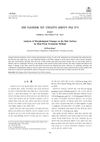 April 2023 in “Han'gug miyong haghoeji/Journal of the Korean society of cosmetology”
April 2023 in “Han'gug miyong haghoeji/Journal of the Korean society of cosmetology” Direct heat perms cause more damage to hair than softening heat perms.
 December 2022 in “Deleted Journal”
December 2022 in “Deleted Journal” Sheep wool keratin solution safely and effectively promotes hair growth.
Low-level light therapy, possibly combined with other treatments, may become a leading hair loss treatment, while hirsutism often worsens with age and lacks preventive options.

Some plant-based ingredients may help with hair growth and care, but more research is needed to confirm their effectiveness.
 21 citations,
July 2002 in “Clinical and Experimental Dermatology”
21 citations,
July 2002 in “Clinical and Experimental Dermatology” Hair care products don't cause hair loss if used correctly.
 August 2018 in “Journal of The American Academy of Dermatology”
August 2018 in “Journal of The American Academy of Dermatology” The moisturizing cream used after a chemical peel was well tolerated and effectively moisturized the skin.
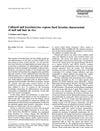 16 citations,
August 1992 in “Archives of dermatological research”
16 citations,
August 1992 in “Archives of dermatological research” Lab-grown nail cells show characteristics similar to natural nail and hair.

Bee pollen, green tea, essential oils, and various plant extracts improve skin and hair health.
81 citations,
December 2007 in “Acta materialia” AFM helped show how hair changes under tension and the effects of damage and conditioner.
11 citations,
June 2001 in “British Journal of Dermatology” c-Myc, Max, and Bin1 help hair follicle cells mature and die.
 1 citations,
August 2022 in “Chemical engineering journal advances”
1 citations,
August 2022 in “Chemical engineering journal advances” Scientists made human hair magnetic by coating it with special nanoparticles.
 February 2019 in “PubMed”
February 2019 in “PubMed” The research found that twisting hair fibers can show changes in stiffness and damage, and help tell apart different hair treatments.
 417 citations,
September 2005 in “PLoS biology”
417 citations,
September 2005 in “PLoS biology” Understanding gene expression in hair follicles can reveal insights into hair growth and disorders.
 84 citations,
April 2013 in “Applied Microbiology and Biotechnology”
84 citations,
April 2013 in “Applied Microbiology and Biotechnology” Mannosylerythritol lipids are good for skin and hair care products.
4 citations,
November 2017 in “PubMed” Miracle fruit seed oil significantly reduces hair breakage in women with damaged hair.
 October 2024 in “BMC Genomics”
October 2024 in “BMC Genomics” Understanding hair follicle development can help improve cashmere quality.
Human hair can almost fully recover its structure within about 1,000 minutes after being stretched.
16 citations,
August 2000 in “Il Farmaco” Men have more tryptophan in their hair than women, and it increases with age and is higher in darker and grey or white hair.
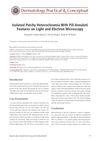 1 citations,
October 2022 in “Dermatology practical & conceptual”
1 citations,
October 2022 in “Dermatology practical & conceptual” Isolated patchy heterochromia with pili annulati can occur without other health issues.
12 citations,
May 2013 in “International Journal of Dermatology” Ethosomes improve black tea extract absorption in hair dye.
 September 2024 in “Skin Research and Technology”
September 2024 in “Skin Research and Technology” AFM can help diagnose lichen planopilaris by identifying specific hair structure changes.
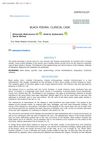 May 2023 in “Archiv EuroMedica”
May 2023 in “Archiv EuroMedica” The article concludes that it's important to know how to identify and treat the rare hair disease black piedra, even in places where it's not usually found.
 13 citations,
August 2012 in “Journal of the American Academy of Dermatology”
13 citations,
August 2012 in “Journal of the American Academy of Dermatology” A rare scalp condition causing hair loss and cysts in young men can be treated effectively with a specific steroid injection.
9 citations,
August 2021 in “Journal of clinical medicine” Pili torti is a rare condition where hair is twisted and breaks easily, often linked to genetic disorders or other health issues.
7 citations,
October 2020 in “International Journal of Cosmetic Science” Different sizes of keratin peptides can strengthen hair, with smaller ones possibly increasing volume and larger ones repairing damage.
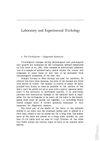 1 citations,
April 2015 in “Current problems in dermatology”
1 citations,
April 2015 in “Current problems in dermatology” The document concludes that the trichogram is a useful tool for diagnosing hair loss and suggests semi-organ cultures for practical trichological research.
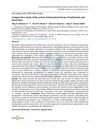 December 2023 in “International journal of high dilution research”
December 2023 in “International journal of high dilution research” Melatonin and Lissotriton improved hair quality and increased activity in mice.
12 citations,
January 2015 in “Skin appendage disorders” Dermoscopy helps quickly identify hair breakage in people of African descent.




















